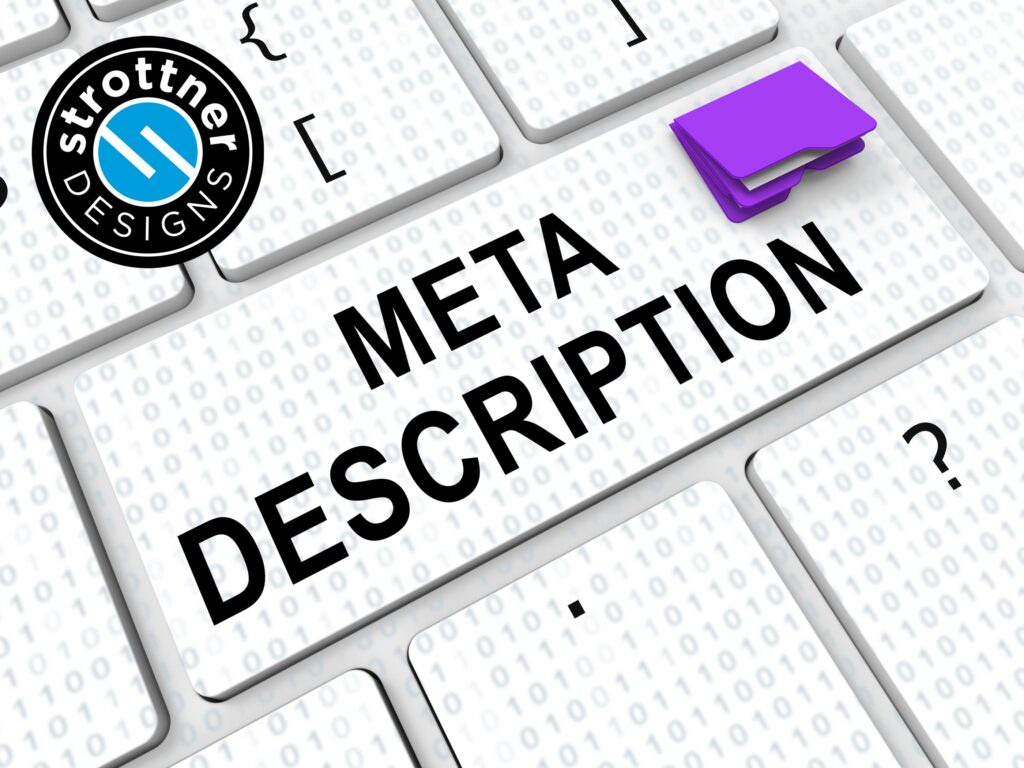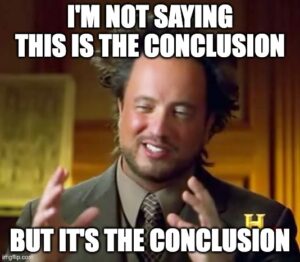What is a Meta Description?
Let’s talk about something that is a bit technical but can significantly impact your online presence: Meta Descriptions. These little snippets of text are an ingredient in the secret sauce that attracts more customers and boosts your search engine optimization (SEO) results. In our last post, we spent more time on Title Tags than any normal person would, and today we’re continuing that trend with an in-depth analysis of Meta Descriptions. We’re going to explain what a Meta Description is, why it’s important for SEO, and how to write an effective one. As readers of our blog have come to expect, we’ll conclude with a shameless plug of our own services, and recommend that you use Strottner Designs for all of your SEO needs. Doing so will ensure that your Meta Descriptions, and all other on-page SEO factors are handled correctly and in-line with best practices!
What is a Meta Description?
A meta description is a brief summary of a webpage’s content that appears in search engine results under the page’s title. Typically, it’s around 150-160 characters long. Think of it as your page’s elevator pitch—a quick and compelling overview that tells potential visitors what your page is all about and why they should click on your link instead of someone else’s.
Specifically, it shares the following information:
- HTML Element: A meta description is an HTML element within a web page’s code.
- Display in SERPs: When your page shows up in search results, the meta description is displayed below the clickable title tag.
- Purpose: It helps users understand the content relevance and encourages them to click through to your page.
- How Does Strottner Use Them: For our Concierge Clients, we tailor the meta description for each page to the content on that page, so that even the sub-pages in our website rank well!
Why Are Meta Descriptions Important?
- First Impressions Matter: Your meta description can be the first interaction potential customers have with your business. A well-written one can capture their interest and encourage them to visit your website. And no matter how perfect your product is, a poorly written one can turn potential customers away!
- Improves Click-Through Rates (CTR): A compelling meta description can increase the likelihood that users will click on your link when it appears in search results. Higher CTR can signal to search engines that your page is valuable and relevant, potentially improving your rankings.
- Enhances Relevance: Search engines sometimes bold the keywords in your meta description that match the user’s search query. This makes your result stand out and seem more relevant to what the user is looking for.
- Provides a Preview: It gives users a sneak peek of what to expect on your page, helping to filter out visitors who may not find your content relevant. This means the traffic you do get is more likely to be interested in your offerings.
- Social Sharing: Social platforms often use meta descriptions when content is shared. Without one, social sites may display random text, affecting user experience.
- How Does Strottner Use Them: If we see that a site has a high number of Impressions, but low CTR, we’ll evaluate the Meta Description and rewrite it to make it more compelling so that it drives more clicks through to the site.
Crafting the Perfect Meta Description
Now that you know why meta descriptions are essential, let’s look at how to create an effective one:
- Keep It Short and Sweet: Aim for 150-160 characters. Anything longer might get cut off in search results, leaving out crucial information.
- Include Relevant Keywords: Use keywords that are relevant to the content of your page and that your potential customers might be searching for. But avoid keyword stuffing—it should read naturally.
- Make It Engaging: Write in a way that sparks curiosity or promises a benefit. Think about what makes your business unique and convey that in a few words.
- Use a Call-to-Action (CTA): Encourage users to take action. Phrases like “Learn more,” “Discover now,” or “Get your free quote” can be effective.
- Be Specific: Clearly describe what users will find on your page. If they know exactly what to expect, they’re likely to click through. If the information they find on the site doesn’t match the description, they will click away.
- Benefits-Focused: Highlight the benefits users will gain by clicking your link.
- How Does Strottner Use Them: Well, we do the six things outlined above, and sometimes we break these rules because we know when that’s acceptable!
Examples of Effective Meta Descriptions
- E-commerce Store: “Shop the latest trends in women’s fashion. Free shipping on orders over $50. Discover your new look today!”
- Local Bakery: “Freshly baked bread, pastries, and cakes made daily in the heart of downtown. Visit us for a taste of homemade goodness!”
- Consulting Services: “Expert business consulting services to help you grow your company. Schedule your free consultation now and start your journey to success.”
- This blog post: “In this post we explain what a Meta Description is, why it’s important for SEO, and how to write an effective one!”
Meta Descriptions – A Pithy Summary
In the grand scheme of your digital marketing strategy, writing a meta description might seem like a minor task. However, it has a significant impact on your website’s performance in search engines. By investing a little time in crafting compelling, keyword-rich meta descriptions, you will attract more visitors to your site and turn those clicks into customers. Head over to our homepage and run a free audit on your website, you’ll see that the meta description is one of the factors that is tested.
In the meantime, we suggest that you take a few moments to review and update the meta descriptions on your website. Your business’s online success might just depend on it! And remember, SEO is complicated, there are a lot of factors…and we just spent 900 words explaining one of the smaller factors. Perhaps it’s time to contact us at support@strottner.com and see what we can do to handle this for you?









